In the rapidly growing blockchain and Web3 space, Particle Network is attracting attention for its ability to provide cutting-edge technologies that simplify and secure the transaction process. So, what is Particles? Let’s dive into the details in the article below.
What is Particles?
What is Particles? It is an advanced blockchain platform that provides technologies for building efficient and secure Web3 applications. Developed with the goal of creating an easy-to-use environment for users to interact with decentralized applications (dApps), Particle Network helps minimize the complexities involved in using blockchain services. This platform introduces significant innovations by simplifying the use of blockchains while avoiding issues like high transaction fees and security risks.
One of the key technologies of Particle Network is Account Abstraction, which eliminates the need for users to manage multiple accounts, wallets, or private keys. This not only makes it easier for developers to build Web3 applications but also offers a seamless and convenient experience for end users. With this technology, users can perform transactions without needing to remember complex details like private keys, making the process simpler and more secure.
This platform supports not just one blockchain but can connect multiple different blockchains, allowing users to perform transactions and interact across platforms like Ethereum, Binance Smart Chain, and others without compatibility issues. This is a crucial factor that positions Particle Network as one of the most advanced platforms in Web3 development.
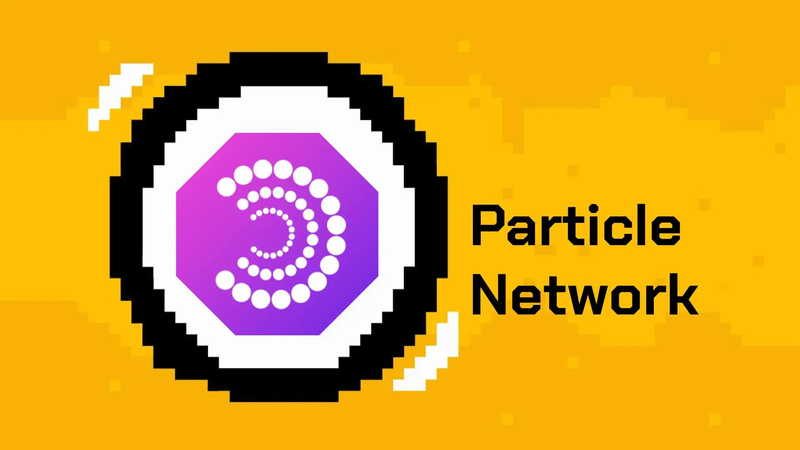
Key technologies of Particle Network
Wallet-as-a-Service (WaaS)
Wallet-as-a-Service is one of the essential services provided by Particle Network, allowing developers to integrate Web3 wallets into their applications without having to create a wallet solution from scratch. With WaaS, users can log into decentralized applications (dApps) using Social Login, simplifying the login process more than ever before. Transactions on the Particle Network platform are executed without the need for users to enter information like private keys or passwords, reducing the complexity of using blockchain platforms.
Moreover, WaaS also enables developers to create smart wallets that help users manage their accounts conveniently and securely. Users can manage accounts and transactions across multiple blockchains without worrying about security or compatibility issues. This is an ideal solution for dApps looking to streamline the user interaction process without developing a separate wallet system.
Confidential zkStack
zkStack is an advanced encryption toolkit from Particle Network, utilizing zk-SNARKs technology to safeguard privacy and security for users. This technology enables users to perform transactions without disclosing personal information, protecting data and preventing threats like phishing or fraud attacks.
What sets zkStack apart is its powerful security without compromising transaction speed. Thanks to zk-SNARKs, a form of advanced encryption, zkStack helps reduce the risk of exposing personal information while ensuring fast and efficient transactions. This is a perfect solution for Web3 applications, where user privacy and security are more important than ever.
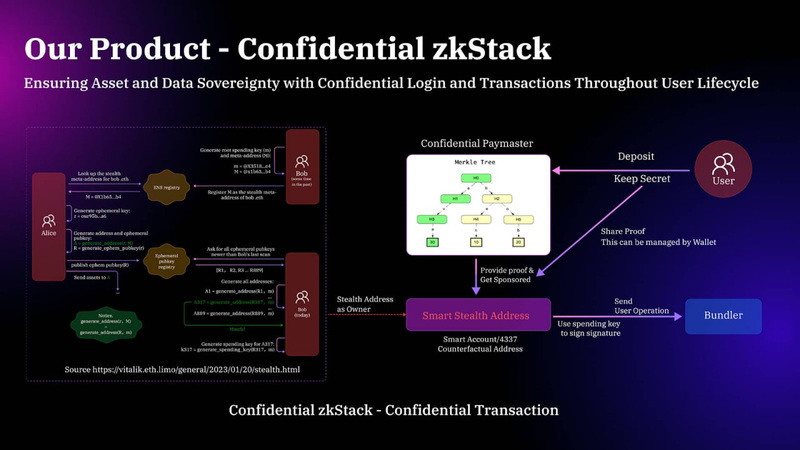
Intent Fusion Protocol
Intent Fusion Protocol is a protocol used by Particle Network to automate transaction processes and save time for users. Instead of manually confirming each step of a transaction, the Intent Fusion Protocol automates this process, reducing complexity and speeding up transactions.
This is especially crucial in the Web3 space, where transactions occur rapidly and continuously. Intent Fusion Protocol helps users complete transactions in just a few simple steps without worrying about delays or issues during the transaction process.
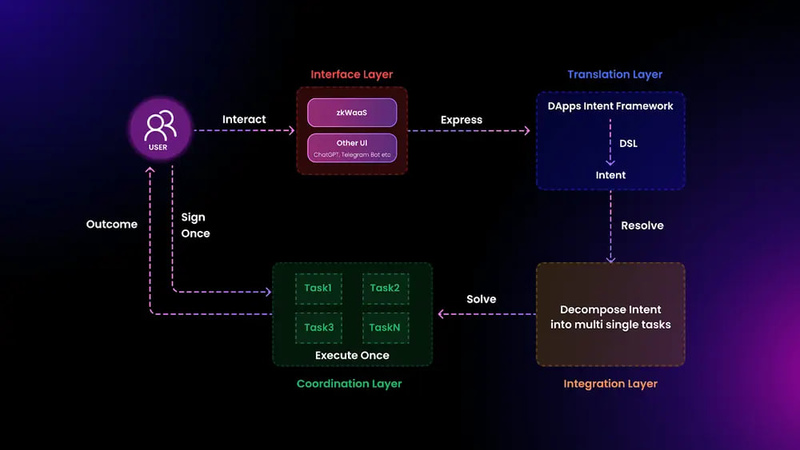
Particle Network’s Omnichain model
One of the standout features of Particle Network is its ability to facilitate transactions across different blockchains through its Omnichain model. Instead of using multiple wallets and accounts for each blockchain, users can perform seamless transactions across blockchains like Ethereum, Binance Smart Chain, and Solana through the Particle Network platform without facing compatibility issues.
The Omnichain model addresses one of the biggest challenges in the blockchain ecosystem: fragmentation between blockchains. Previously, conducting transactions and transferring assets between different blockchains involved many barriers, such as high fees, long wait times, and security concerns. However, with Omnichain, users can easily transact across multiple blockchain platforms without these problems.
This also opens up new opportunities for developers building decentralized applications (dApps), as they no longer need to worry about making their apps compatible with each specific blockchain. Instead, they can simply integrate with the Particle Network platform, which will automatically handle interactions between blockchains efficiently.
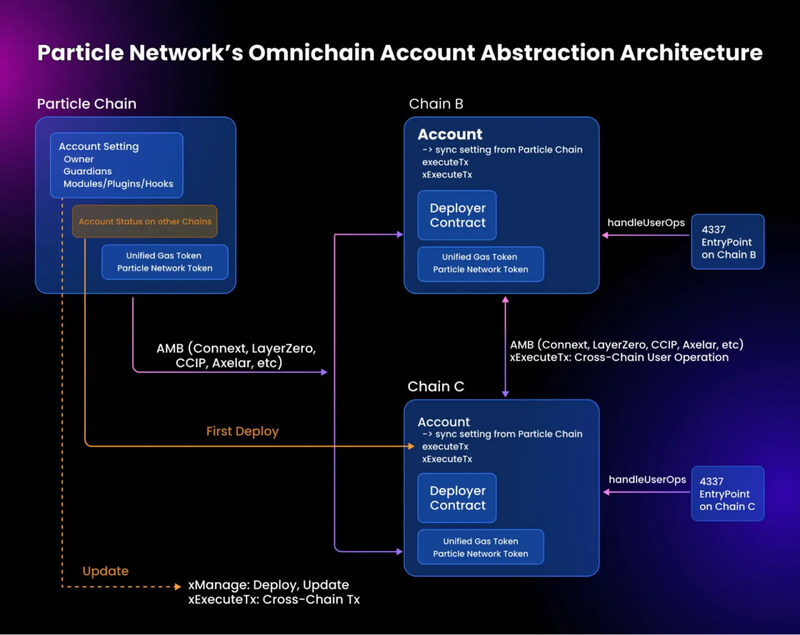
Main products of Particle Network
Smart Wallet-as-a-Service
Particle Network’s Smart Wallet-as-a-Service offers developers a complete solution for integrating smart wallets into their dApps without building from scratch. The Account Abstraction feature allows users to manage their accounts and transactions without needing to remember complex private keys.
This product is crucial for dApps in the Web3 space, as it simplifies the process of user interaction while maintaining security. Developers can easily implement this smart wallet into their applications without spending excessive time or resources.
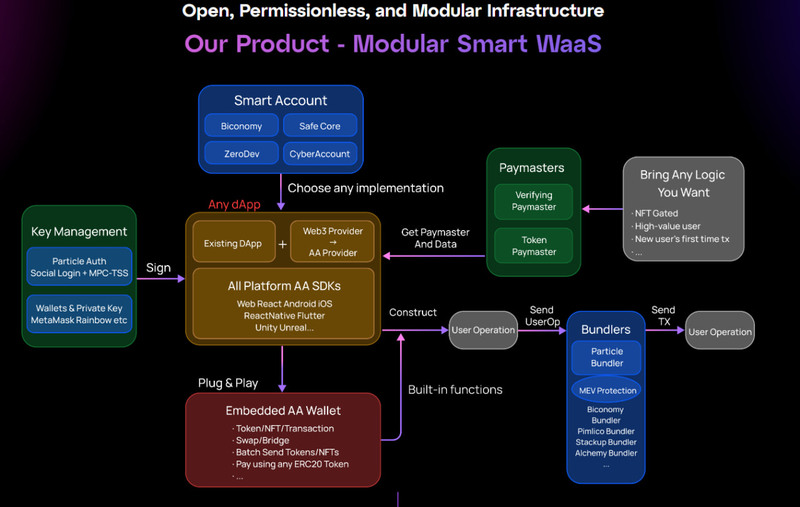
BTC Connect
BTC Connect is a standout product of Particle Network that integrates Account Abstraction into the Bitcoin ecosystem. This means Bitcoin users can easily utilize Particle Network’s features without switching to other blockchains like Ethereum.
With BTC Connect, Bitcoin users can perform transactions quickly and securely while taking advantage of products like zkStack and Omnichain, all without worrying about compatibility between blockchains.
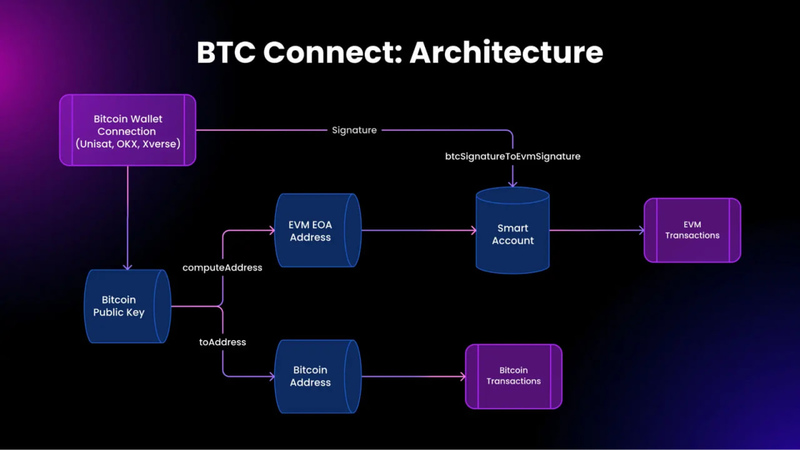
Universal Accounts
Universal Accounts is a prominent feature of Particle Network that allows users to manage accounts across multiple blockchains easily. Instead of creating and managing multiple accounts for each blockchain, users only need one account to access all the Web3 services that Particle Network offers.
This simplifies the process of using dApps and transacting on blockchains, saving users time and effort in managing their accounts and assets.
Particle Network Token iniformation
Currently, Particle Network has not yet launched an official token for the project. However, the project has announced plans to utilize tokens for operations within the Particle Chain network. Particle Chain is a new platform using zkEVM technology, which allows easy integration with EVM ecosystems and offers strong scalability thanks to the Omnichain AA (Account Abstraction) mechanism.
Basic Information about PARTI Token
- Token Name: PARTI
- Ticker: PARTI
- Blockchain: Ethereum
- Token standard: ERC-20
- Contract address: 0xff20817765cb7f73d4bde2e66e067e58d11095c2
- Token type: Utility, Governance
- Total supply: 99,213,408,535 PARTI
- Circulating supply: 99,213,408,535 PARTI
With the introduction of PARTI Token, users will have the opportunity to participate in project governance and use the token for transactions within the Particle Network ecosystem. The utility and governance features of the token allow holders to make important decisions and leverage the network’s services.
Particle Network development roadmap
Particle Network has outlined a clear development roadmap, promising to make the project one of the most notable platforms in the Web3 and blockchain space. Below is the detailed information about the project’s roadmap:
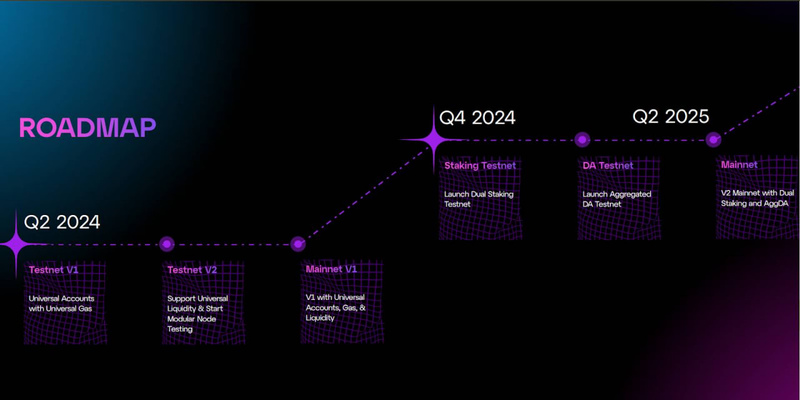
Q2/2024
- Testnet V1: Launch Universal Accounts and Universal Gas, offering a platform that supports global accounts and simplifies gas usage for transactions.
- Testnet V2: Begin supporting Universal Liquidity, enabling easy exchange and payments within the ecosystem. Testing of Modular Node will also begin, optimizing transactions.
- Mainnet V1: The launch of Mainnet V1 will bring Universal Accounts, Gas, and Liquidity support, marking a significant milestone in providing services to the user community.
Q4/2024
- Dual Staking Testnet Release: The Dual Staking feature will be introduced on Testnet, allowing users to participate in token staking for rewards, supporting multiple asset types.
- Aggregated DA Testnet Launch: Aggregated Data Availability (DA) will be deployed on Testnet, enhancing data processing and security for the Particle ecosystem.
Q2/2025
- Mainnet V2 Launch with Dual Staking and Aggregated DA: Particle Network will roll out Mainnet V2, integrating both Dual Staking and Aggregated Data Availability for optimized features and performance.
Particle Network development team
This project was founded and developed by a team of experienced professionals in the fields of technology and investment, including the following individuals:
- Pengyu Wang – Founder: Pengyu Wang is the founder of Particle Network, as well as the Investment Director at SAIF Partners and CEO of MiniJoy. He began building Particle Network in March 2022, bringing valuable experience from the investment and startup industries.
- Tao Pan – CTO: A graduate of Tsinghua University, Tao Pan is a technology expert with extensive experience in building Social Gaming platforms. He successfully raised $15M in funding from Alibaba.
- Carlos Maximiliano Cano – Content Manager: Carlos has a strong background in Web3, with experience working at companies such as D-Core, Fringe Finance, and Panther Protocol.
Investors of Particle Network
Particle Network has raised $25 million through three funding rounds, attracting the participation of renowned investment funds. Notable investors include: The Spartan, Hashkey, Animoca Brands, LongHash Ventures, Insignia Ventures Partners, CyberConnect, and BitCoke Ventures.
The participation of these funds not only demonstrates the potential of project but also creates significant opportunities for the project’s future growth.
Strategic partners of Particle Network
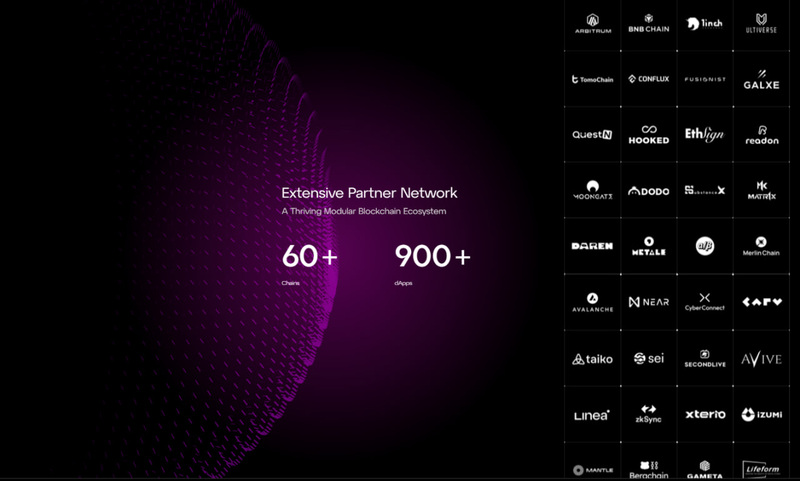
Particle Network is currently collaborating with several major strategic partners in the Web3 space. These partners are well-established names with a strong influence in the blockchain and cryptocurrency communities. Some of Particle Network’s key partners include: Taiko, Linea, Mantle, UniSat Wallet, B² Network, BRC420, and BEVM.
These partnerships will help Particle Network optimize its services and features, expand its network, and enhance the applicability of its solutions in current blockchain projects.
Through this article, we have explained in detail to you “What is Particles?”
Particle Network is proving itself to be one of the most promising projects in the Web3 space, with a clear development roadmap and innovative features like Universal Accounts, Dual Staking, and Aggregated Data Availability. With a highly experienced founding team, support from reputable investors, and major strategic partnerships, this project is poised to bring new opportunities to users and investors in the near future.
If you want to stay updated on detailed information about Particle Network and other blockchain projects, visit Blockchain Global Network for the most useful insights.

RELATED POSTS
A definitive guide to the best crypto airdrop platforms
Finding legitimate crypto airdrops can...
Toby Airdrop: A complete guide to participation from A to Z
Participate in the Toby Airdrop...
What is dYdX? A deep dive into Decentralized trading
What is dYdX? It is...
Keith Grossman: The journey from media to finTech
Discover the life and career...
Privacy Considerations: Navigating the Future of Student Data Management
Discover how to ensure privacy...
What is the ALIENX Airdrop and How to Participate Effectively
Do you want to invest...
Blockchain Technology Applications – 3 Key Highlights in the economy
Blockchain Technology Applications are increasingly...
What is DAG Blockchain? Understanding how it works
DAG Blockchain has become increasingly...
What is ACA Coin? Learn about Acala Network Token
ACA Coin is a vital...
CoinList and U2U Network – Partnering to Build the Future of Decentralized Infrastructure
The cryptocurrency market is witnessing...
Who founded Bitcoin? Who is the owner of bitcoin?
Who founded Bitcoin is a...
SonicX Airdrop – Exciting Tap-to-Earn Gaming Experience
SonicX airdrop offers an incredibly...
HOT!!! Notcoin Accuses Bidget of Lying!
Notcoin Accuses Bidget of Lying!!!...
SEC to Host Second Crypto Meeting on April 25
The U.S. Securities and Exchange...
Cryptocurrency Unveiled: Unlocking the Mysteries Beyond Blockchain
How is cryptocurrency different from...
Near coin Revolution: Is this the Crypto you’ve been waiting for?
Near Coin is making waves...